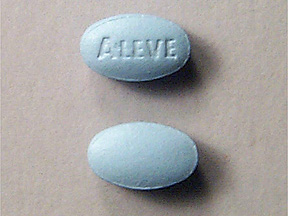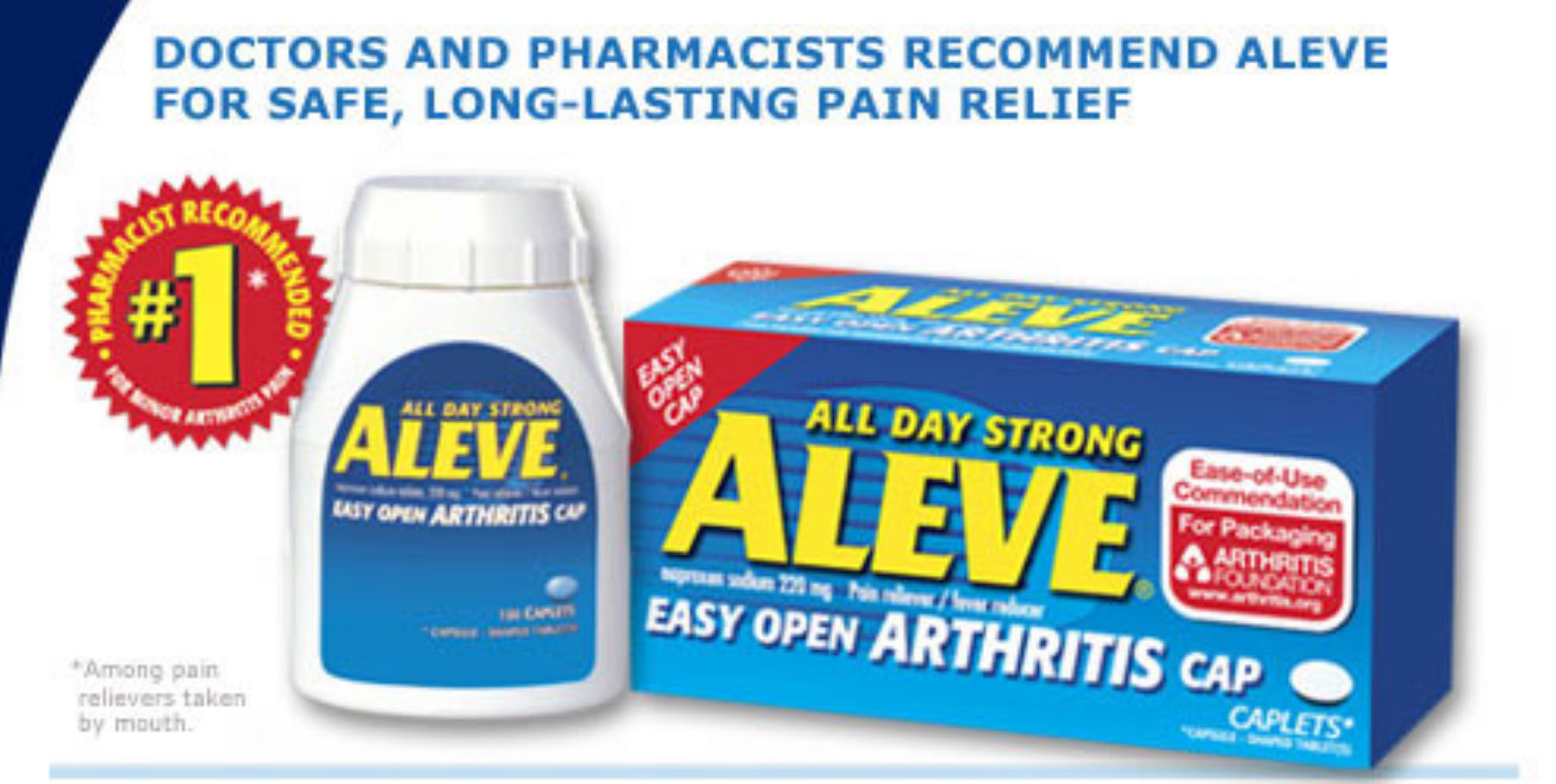What is Aleve?
Aleve (naproxen) is a nonsteroidal anti-inflammatory drug (NSAID). Naproxen works by reducing hormones that cause inflammation and pain in the body.
Aleve is used to temporarily relieve minor aches and pains due to arthritis, muscular aches, backache, menstrual cramps, headache, toothache,and the common cold. Aleve is also used to temporarily reduce fever.
Aleve may also be used for purposes not listed in this medication guide.
Important information


You should not use Aleve if you have a history of allergic reaction to aspirin or other NSAID (nonsteroidal anti-inflammatory drug).
Aleve can increase your risk of fatal heart attack or stroke, especially if you use it long term or take high doses, or if you have heart disease. Do not use Aleve just before or after heart bypass surgery (coronary artery bypass graft, or CABG).
Get emergency medical help if you have chest pain, weakness, shortness of breath, slurred speech, or problems with vision or balance.
Aleve may also cause stomach or intestinal bleeding, which can be fatal. These conditions can occur without warning while you are using Aleve, especially in older adults.
Before taking this medicine
Aleve can increase your risk of fatal heart attack or stroke, especially if you use it long term or take high doses, or if you have heart disease. Even people without heart disease or risk factors could have a stroke or heart attack while taking this medicine.
Do not use this medicine just before or after heart bypass surgery (coronary artery bypass graft, or CABG).
Aleve may also cause stomach or intestinal bleeding, which can be fatal. These conditions can occur without warning while you are using naproxen, especially in older adults.
You should not use Aleve if you are allergic to naproxen, or if you have ever had an asthma attack or severe allergic reaction after taking aspirin or an NSAID.
Ask a doctor or pharmacist if it is safe for you to use this medicine if you have:
heart disease, high blood pressure, high cholesterol, diabetes, or if you smoke;
a history of heart attack, stroke, or blood clot;
a history of stomach ulcers or bleeding;
asthma;
liver or kidney disease; or
fluid retention.
Taking Aleve during the last 3 months of pregnancy may harm the unborn baby. Do not use this medicine without a doctor’s advice if you are pregnant.
Naproxen can pass into breast milk and may harm a nursing baby. You should not breast-feed while using this medicine.
Do not give Aleve to a child without medical advice.
How should I take Aleve?
Use Aleve exactly as directed on the label, or as prescribed by your doctor. Do not use in larger or smaller amounts or for longer than recommended. The smallest effective dose should be used.
Dosage for adults and children 12 years and older: Take 1 Aleve capsule or tablet every 8 to 12 hours while symptoms last. For the first dose you may take 2 capsules or tablets within the first hour. Do not exceed 2 capsules or tablets in any 8 to 12 hour period – do not exceed 3 capsules or tablets in a 24-hour period.
Drink a full glass of water with each dose. If taken with food, Aleve may take longer to work.
Store Aleve at room temperature away from moisture and heat.
Read all patient information, medication guides, and instruction sheets provided to you. Ask your doctor or pharmacist if you have any questions.
What happens if I miss a dose?
Since Aleve is sometimes used only when needed, you may not be on a dosing schedule. If you are on a schedule, use the missed dose as soon as you remember. Skip the missed dose if it is almost time for your next scheduled dose. Do not use extra medicine to make up the missed dose.
What happens if I overdose?
Seek emergency medical attention or call the Poison Help line at 1-800-222-1222.
What should I avoid while taking Aleve?
Avoid drinking alcohol. It may increase your risk of stomach bleeding.
Avoid taking aspirin while you are taking Aleve.
Ask a doctor or pharmacist before using any cold, allergy, or pain medicine. Many medicines available over the counter contain aspirin or other medicines similar to naproxen. Taking certain products together can cause you to get too much of this type of medication. Check the label to see if a medicine contains aspirin, ibuprofen, ketoprofen, or naproxen.
Ask your doctor before using an antacid, and use only the type your doctor recommends. Some antacids can make it harder for your body to absorb Aleve.
Aleve side effects
Get emergency medical help if you have signs of an allergic reaction to Aleve: sneezing, runny or stuffy nose; wheezing or trouble breathing; hives; swelling of your face, lips, tongue, or throat.
Get emergency medical help if you have signs of a heart attack or stroke: chest pain spreading to your jaw or shoulder, sudden numbness or weakness on one side of the body, slurred speech, feeling short of breath.
Stop using Aleve and call your doctor at once if you have:
shortness of breath (even with mild exertion);
swelling or rapid weight gain;
the first sign of any skin rash, no matter how mild;
signs of stomach bleeding – bloody or tarry stools, coughing up blood or vomit that looks like coffee grounds;
liver problems – nausea, upper stomach pain, itching, tired feeling, flu-like symptoms, loss of appetite, dark urine, clay-colored stools, jaundice (yellowing of the skin or eyes);
kidney problems – little or no urinating, painful or difficult urination, swelling in your feet or ankles, feeling tired or short of breath;
low red blood cells (anemia) – pale skin, feeling light-headed or short of breath, rapid heart rate, trouble concentrating; or
severe skin reaction – fever, sore throat, swelling in your face or tongue, burning in your eyes, skin pain followed by a red or purple skin rash that spreads (especially in the face or upper body) and causes blistering and peeling.
Common Aleve side effects may include:
indigestion, heartburn, stomach pain, nausea;
diarrhea, constipation;
headache, dizziness, drowsiness;
swelling in your hands or feet;
bruising, itching, rash, sweating; or
ringing in your ears.
This is not a complete list of side effects and others may occur. Call your doctor for medical advice about side effects. You may report side effects to FDA at 1-800-FDA-1088.
What other drugs will affect Aleve?
Ask your doctor before using Aleve if you take an antidepressant such as citalopram, escitalopram, fluoxetine (Prozac), fluvoxamine, paroxetine, sertraline (Zoloft), trazodone, or vilazodone. Taking any of these medicines with an NSAID may cause you to bruise or bleed easily.
Ask a doctor or pharmacist if it is safe for you to use Aleve if you are also using any of the following drugs:
lithium;
methotrexate;
probenecid;
a blood thinner (warfarin, Coumadin, Jantoven);
heart or blood pressure medication, including a diuretic or “water pill”; or
steroid medicine (such as prednisone).
This list is not complete. Other drugs may interact with naproxen, including prescription and over-the-counter medicines, vitamins, and herbal products. Not all possible interactions are listed in this medication guide.